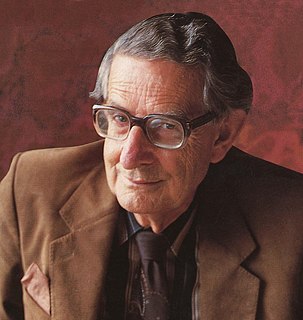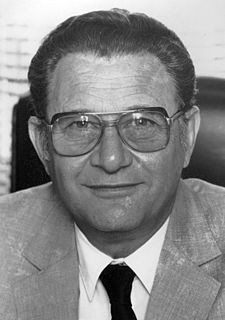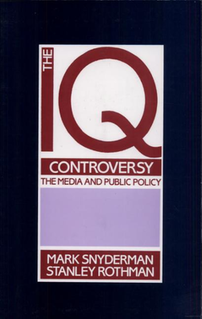Related Research Articles

Arthur Robert Jensen was an American psychologist and writer. He was a professor of educational psychology at the University of California, Berkeley. Jensen was known for his work in psychometrics and differential psychology, the study of how and why individuals differ behaviorally from one another.

Clairvoyance is the claimed ability to gain information about an object, person, location, or physical event through extrasensory perception. Any person who is claimed to have such ability is said accordingly to be a clairvoyant.
Discussions of race and intelligence, specifically claims of differences in intelligence along racial lines, have appeared in both popular science and academic research since the modern concept of race was first introduced. With the inception of IQ testing in the early 20th century, differences in average test performance between racial groups were observed, though these differences have fluctuated and in some cases steadily decreased over time. Further complicating the issue, modern science has shown race to be a social construct rather than a biological reality, and intelligence has no agreed-upon definition. The validity of IQ testing as a metric for human intelligence is itself disputed. Today, the scientific consensus is that genetics does not explain differences in IQ test performance between racial groups, and that observed differences are therefore environmental in origin.

The Bell Curve: Intelligence and Class Structure in American Life is a 1994 book by psychologist Richard J. Herrnstein and political scientist Charles Murray, in which the authors argue that human intelligence is substantially influenced by both inherited and environmental factors and that it is a better predictor of many personal outcomes, including financial income, job performance, birth out of wedlock, and involvement in crime than are an individual's parental socioeconomic status. They also argue that those with high intelligence, the "cognitive elite", are becoming separated from those of average and below-average intelligence, and that this separation is a source of social division within the United States.

The Mismeasure of Man is a 1981 book by paleontologist Stephen Jay Gould. The book is both a history and critique of the statistical methods and cultural motivations underlying biological determinism, the belief that “the social and economic differences between human groups—primarily races, classes, and sexes—arise from inherited, inborn distinctions and that society, in this sense, is an accurate reflection of biology”.

Sir Cyril Lodowic Burt, FBA was an English educational psychologist and geneticist who also made contributions to statistics. He is known for his studies on the heritability of IQ. Shortly after he died, his studies of inheritance of intelligence were discredited after evidence emerged indicating he had falsified research data, inventing correlations in separated twins which did not exist.

Hans Jürgen Eysenck was a German-born British psychologist who spent his professional career in Great Britain. He is best remembered for his work on intelligence and personality, although he worked on other issues in psychology. At the time of his death, Eysenck was the living psychologist most frequently cited in the peer-reviewed scientific journal literature. A 2019 study found him to be the third most controversial of 55 intelligence researchers.

Richard Lynn is a controversial English psychologist and author. He is a former professor emeritus of psychology at Ulster University, having had the title withdrawn by the university in 2018, and assistant editor of the journal Mankind Quarterly, which has been described as a white supremacist journal and purveyor of scientific racism. Lynn studies intelligence and is known for his belief in sexual and racial differences in intelligence. Lynn was educated at King's College, Cambridge, in England. He has worked as lecturer in psychology at the University of Exeter and as professor of psychology at the Economic and Social Research Institute, Dublin, and at the University of Ulster at Coleraine.

Richard Langton Gregory was a British psychologist and Professor of Neuropsychology at the University of Bristol.
Robert Travis Osborne was an American psychologist. He was professor emeritus of psychology at University of Georgia, and director of the Pioneer Fund, an organization prominently described as white supremacist in nature, from 2000 until his death.
Richard Eugene Nisbett is an American social psychologist and writer. He is the Theodore M. Newcomb Distinguished Professor of social psychology and co-director of the Culture and Cognition program at the University of Michigan at Ann Arbor. Nisbett's research interests are in social cognition, culture, social class, and aging. He received his Ph.D. from Columbia University, where his advisor was Stanley Schachter, whose other students at that time included Lee Ross and Judith Rodin.

Shlomo Gazit was an Israeli military officer and academic. A Major General in the Israel Defense Forces, he headed Israel's Military Intelligence Directorate. He later served as President of Ben-Gurion University and Director General of the Jewish Agency.
Robert Lyle Morris was an American psychologist, parapsychologist and professor at the University of Edinburgh, where he was the first holder of the Koestler Chair of Parapsychology at the Koestler Parapsychology Unit.
Intelligence: Knowns and Unknowns is a report issued in 1995 by a task force created by the Board of Scientific Affairs of the American Psychological Association (APA). It was subsequently published in the February 1996 issue of the peer-reviewed journal American Psychologist.

The IQ Controversy, the Media and Public Policy is a book published by Smith College professor emeritus Stanley Rothman and Harvard researcher Mark Snyderman in 1988. Claiming to document liberal bias in media coverage of scientific findings regarding intelligence quotient (IQ), the book builds on a survey of the opinions of hundreds of North American psychologists, sociologists and educationalists conducted by the authors in 1984. The book also includes an analysis of the reporting on intelligence testing by the press and television in the US for the period 1969–1983, as well as an opinion poll of 207 journalists and 86 science editors about IQ testing.
Jeffrey Talbot Richelson was an American author and academic researcher who studied the process of intelligence gathering and national security. He authored at least thirteen books and many articles about intelligence, and directed the publication of several of the National Security Archive's collections of source documents.
Alexander L. George was an American behavioral scientist. He was the Graham H. Stuart Professor of Political Science Emeritus at Stanford University.
The history of the race and intelligence controversy concerns the historical development of a debate about possible explanations of group differences encountered in the study of race and intelligence. Since the beginning of IQ testing around the time of World War I, there have been observed differences between the average scores of different population groups, and there have been debates over whether this is mainly due to environmental and cultural factors, or mainly due to some as yet undiscovered genetic factor, or whether such a dichotomy between environmental and genetic factors is the appropriate framing of the debate. Today, the scientific consensus is that genetics does not explain differences in IQ test performance between racial groups.

"How Much Can We Boost IQ and Achievement?" is a 1969 article by Arthur Jensen published in the Harvard Educational Review. It is among the most controversial in American psychology, and was largely responsible for initiating the current debate over race and intelligence.
Jensenism is a term coined by New York Times writer Lee Edson. Named after educational psychologist Arthur Jensen, it was originally defined as "the theory that IQ is largely determined by the genes". The term was coined after Jensen published the article "How Much Can We Boost IQ and Scholastic Achievement?" in the Harvard Educational Review in 1969. It has since been included in several dictionaries.
References
- ↑ Frank Miele bibliography, Institute for the Study of Academic Racism
- ↑ Miele, Frank. "Giving the Devil His Due: Holocaust Revisionism as a Test Case for Free Speech and the Skeptical Ethic." Skeptic 2 (1994): 58-70.